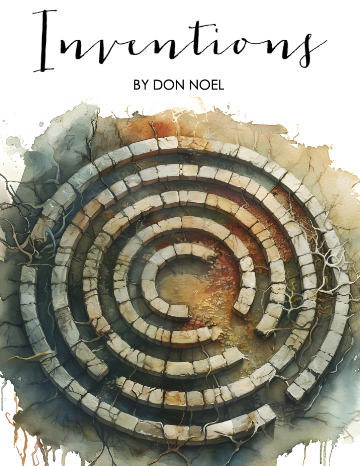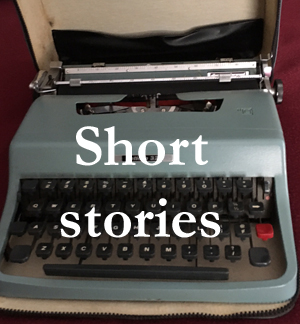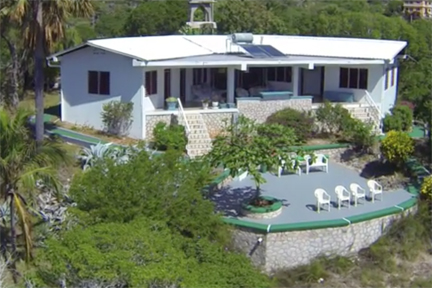We were both fourteen when Vinnie invented the electric rotary lawnmower.
This was late in the Eisenhower  years. It might have been invented already by someone else, I suppose, but I’d never seen one, nor had anyone we knew.
years. It might have been invented already by someone else, I suppose, but I’d never seen one, nor had anyone we knew.
Our Scoutmaster, who was priest at Saint Luke’s, offered us a job mowing the church yard and cemetery. We went to look: a lot of grass through which to push old-fashioned reel mowers. “Give us a couple of days,” Vinnie said, giving me a wink that I didn’t understand. “OK if we do it Saturday morning?”
Father Bob agreed, and we started home. “Perfect!” Vinnie said. “I had a brainstorm last week, and now you can help me make it.”
My help in such projects was almost entirely encouragement while Vinnie did the work. He was a wizard with tools, and a fountain of ideas. He soon had an old electric motor on his father’s basement workbench, probably from a prewar washing machine. He’d assembled four handspan-sized cartwheels, an old lawnmower handle and a thick slab of plywood about two feet square. It was all stuff he’d scavenged and brought back – with me as donkey – from curbside garbage in an affluent neighborhood that was on our route to and from Edison Junior High.
“All we need to do is mount the motor, get a blade, and sharpen it. Papa says he’ll get me a piece of tempered steel.”
I knew by now that “Papa” wasn’t a childish name; it was Sicilian. Vincenzo Alviggio had immigrated as a newlywed, and in time became a machine operator at a company making parts for the aircraft factory. He was known to neighbors as Enzo. I called him Mr. Alviggio when I was first introduced; he insisted I call him Papa. Vinnie was Vincenzo Alviggio Jr.
I had no idea what machine operators did, nor what tempered steel was, but it hardly mattered: I was to hold things while Vinnie cut or hammered or fitted; I was then to scrounge several stout extension cords, as long as possible, from neighbors. Vinnie’s last step Friday afternoon was to grind sharp edges on the blade-to-be, dipping it into a coffee can of water when it grew red-hot. “To keep the temper, y’know?”
By then I did know, having looked it up in the World Book Encyclopedia that my parents had bought me. That set was a treasure I took for granted. Vinnie was excited when I first mentioned it, and came to our house occasionally to look stuff up.
We were an odd pair: I was skinny, tall and blond; Vinnie was a dark-thatched fireplug. I, on my way to becoming junior high valedictorian, was already weighing the virtues of Harvard or Yale. Vinnie, despite his forays into our World Book, was a middle-of-the-pack student. He was smart as hell about some things, but not books. In that era’s stratified academic grouping, the only class we shared was gym.
Our houses were ten minutes – and decades – apart. The Alviggio home, built before the turn of the century, was on a busy commuter street, part of a tightly-packed row of two-story houses with faded brown siding, bleached wood-shingle roofs and postage-stamp yards, most of them barren of grass. Papa was at work modernizing the plumbing and wiring of their house, with a lot of help from Vinnie. His neighbors couldn’t afford to hire such work, and couldn’t do it themselves, so the rest of the block was in decay.
My family’s house was one of only three near the foot of a long road that climbed Lookout Hill in unpopulated solitude, paved primarily for the benefit of Public Works trucks. Built late in the Depression when skilled labor was cheap, all three were painted bright white and were twice the size of the Alviggios’. My bedroom was partitioned out of a finished third floor attic; my parents’ bedroom had its own tiled shower stall with fancy side-jets; our screened back porch overlooked a long back yard that faded into an ancient forest.
Dad was an up-and-coming lawyer; Mom would soon go back to teaching. They could have afforded a tonier neighborhood, but had an egalitarian streak. Vinnie’s Papa, a Machinists Union stalwart, was well paid by what I came to know as blue-collar standards, but his Mama didn’t work, and there were younger siblings. A much older brother had gone to college, thanks to the GI Bill, but Vinnie didn’t even dream of higher education. “The Aircraft” offered a select few well-paid “tool-and-die-maker” jobs; that’s what Vinnie aspired to.
Boy Scouts had brought us together, and we just liked each other. I don’t think he resented my college aspirations, and I didn’t until much later regret that he had so little chance of fulfilling his potential.
His lawnmower worked like a charm, with a minor problem: He’d forgotten to install a switch, so had to holler at me to plug or unplug the extension cords to make it stop or go. We finished the yard in short order; Father Bob paid us and suggested that adding a switch might be not only a safety feature but also a step toward an electrician merit badge. We began cutting neighbor’s lawns – I because my parents thought I should have manual work experience, and Vinnie because he needed the money.
And he went on inventing things.
In a tag sale, Dad found a pair of sled runners ten feet long. Vinnie built a sled, framed with galvanized pipe. It was a ton to tow up our Lookout Hill, but worth the effort. Public Works always plowed the unpopulated piece of the road above our house with a raised blade, packing the snow into a hard, slick surface. On the Vinnie-restored sled, we rocketed down with eight riders, our girlfriends clutching us and screaming their delight.
The plowed pavement from our house on down slowed the sled somewhat, but it still tended to fly across the thoroughfare at the foot of the road. At Vinnie’s suggestion, we began spreading ashes from our coal furnaces out on the street. That not only stopped the sled before reaching the road, but did so in a shower of sparks that made the girls clutch harder.
Late in my junior year I bought a used VW Beetle. Vinnie patiently taught me the rudiments of auto mechanics, and helped me paint it. He also managed, despite mismatched threads, to replace my floor gearshift head with a tavern’s beer-tap knob.
A year later, his Papa helped him buy a car of his own, a mid-30s Chevrolet they could afford because absolutely everything needed fixing. Happily, parts could still be found at a nearby auto junkyard. I was glad to drive Vinnie there occasionally, watching in awe as he canvassed the yard, found a vintage Chevy, unbolted the needed part and paid on the way out. I was sure that if he found a junkyard with a half-dozen such cars, he could assemble the parts to put at least one of them back on the road, fully functional.
Years later, my Dad represented an inventor whose full-time job was to devise all manner of tools and processes and gadgets for a small factory. Vinnie would have been perfect for a job like that. Dad’s client got the job because he was an engineer with advanced college degrees; Vinnie had no such credentials, and no opportunity to acquire them.
We stayed in touch after graduation largely because Susie McGrady, our class secretary, organized reunions. I got my bachelor’s from Harvard and stayed in Boston to work for a small import-export firm. Vinnie never left town: He got a job at The Aircraft with Papa, married our classmate Maria Rossi, bought a small Cape Cod bungalow and by the time of our first reunion, five years after graduation, had a three-year-old boy.
It was like old times. I, still single, sat at Vinnie’s table. When the party ended, he drove Maria and his boy home and then came to meet me at Pasquale’s Taverna, where we nursed beers and caught up with each other’s lives and recent history until the place closed at 2 a.m. We then sat in Vinnie’s kitchen talking until, exhausted, I had to go to my hotel room for a few hours’ sleep before starting back to Boston.
I was glad to learn that we were both Democrats, both worried about LBJ’s buildup of troops in Vietnam, both supportive of his signing Medicare into law just the year before. (Papa would be an early beneficiary.) Vinnie, like his father, tolerated a growing Negro presence in the factory only because they were veterans deserving of at least some respect.
He was cool to LBJ’s civil rights bill. When I mentioned Dr. Martin Luther King Jr., he asked – genuinely unsure, it seemed – “Which one is the Black Muslim, him or Malcolm X?” At The Aircraft, he joined Papa in demanding that the newcomers all join the union, because, he said, it was well known that generations of slavery had created a race that would “work like hell for not much money, and would take jobs away from whites.”
Susie McGrady decided five-year reunions would be too much work, so we agreed to meet next in another decade. Long before that, Vietnam became a bloody quagmire, and the Selective Service draft, dormant for decades, was re-activated. I enrolled in law school, minimizing any chance of being called up. Vinnie was assigned a foreboding-low draft number. Despite being a family man he seemed likely to be conscripted, so he chose to enlist.
I suspected that he was prodded by Papa, who wanted his son to be an American patriot. The Army recognized his aptitudes, taught him to repair helicopters, and sent him to Vietnam.
I wrote periodically, saying little about my studies (to avoid reminding him that I ought to be there with him), so mostly I caught him up on class gossip and sports. He was compelled by Army rules to say little about where he was or how the war was going. It was a sterile exchange.
Once, during that time we were half a world apart, I took my new bride to visit Maria, paying a babysitter and taking her to the Taverna. I was glad both to succor her and to ease my concern about Vinnie, who had managed to convey that his helicopter maintenance unit was far from the front lines, so he was relatively safe. But she was obviously worried, and I was too. It would have been devastating if he’d died in ‘Nam while I hid out in cavernous law libraries.
I promised myself to write him more often. I subscribed to the hometown weekly so I could enclose clippings rather than brag about graduating at the head of my class and winning an internship with the Massachusetts chief justice.
When Vinnie mustered out, Susie McGrady planned an impromptu welcome-home reunion. I wanted to go, but my internship was demanding, and Annette had weeks before given me a baby boy who needed attention. The best I could do was to phone Moscarillo’s Bakery and arrange a huge cake with a helicopter motif.
In retrospect, I wish I hadn’t. It was flamboyant, as though designed to make me look successful and important. Every ooh and ahh from my classmates (Susie said there was a lot of that) detracted from the real point of the evening, honoring Vinnie. I telephoned to welcome him back, and he thanked me for the cake. I didn’t know how to apologize, to repair my showy damage, let alone bridge the gap I felt growing between us.
Our next full-scale reunion was in June of 1976. Nixon had resigned after Watergate; Gerald Ford had completed getting us messily out of Vietnam; a Georgia peanut farmer was about to become the Democratic nominee in an expected hard-fought challenge to Ford’s re-election.
Susie again managed crepe streamers and paper tablecloths in school colors. The turnout was good. Brian Wallace, who’d become a pastor, led a prayer for two classmates who’d died in Vietnam. We for the most part ignored the looming political contest and enjoyed each other; everyone had kids to talk about, but of course no grandchildren yet.
After the party, Vinnie and I put our wives to bed – his Maria at home, my Annette in a motel – and went to Luigi’s Taverna. (Mario Pasquale had retired and sold the place.) We nursed beers until closing time again and came close to renewing friendship.
He was still in the bungalow he’d bought when he married, unable to afford a bigger house. I’d thought he might find new and better work in helicopters, but “Vietnam vets with chopper experience are a dime a dozen,” he said, so he was still, reluctantly, at The Aircraft.
No one was getting overtime. In deals to sell overseas, the company had contracted many parts from European companies; Vinnie had begun to distrust the idea of free trade. In shops like his, the Machinists had agreed to let some new workers be hired at lower wages, but had at least bargained to get the old-timers grandfathered at higher pay. “Maybe I’m lucky,” Vinnie said. “They took me back at my old rate.” He didn’t say it in a lucky tone of voice.
His son Vincent, starting high school, was considering a then-new community college to find something more promising than factory work. The younger child, Mary, was still in junior high. “Half the kids in their classes are black,” Vinnie said. “Well, maybe not half, but a lot. They don’t seem to mind.” Vinnie minded, and was sure that even if Vincent tried to get factory work, he would be the last hired. “God-damned affirmative action,” he said.
We still had some politics in common. He blamed Nixon for prolonging the war and Ford for not reviving the economy. He was still a Democrat. I liked Carter; he hoped Teddy Kennedy might snare the nomination, but would settle for the peanut farmer. “He carries that garment bag from the car on his shoulder. I see it on TV. So maybe he understands little guys like me.”
I managed to say little about myself. I was about to be made partner in a major law firm. I had a big house in a Boston suburb, where I joined other liberals in seeking ways to integrate our kids’ white-enclave schools. My Benjie and Connie, younger than his kids, were very bright, sure bets for an Ivy League college when the time came. Like his kids, neither of mine showed any interest in Boy or Girl Scouts.
A decade later, the turnout for our 25th anniversary reunion was terrific. There had been a few more deaths, but attendance was up – some came from halfway across the country – so Susie hired a small band that played oldies from our era. People were talking about January’s Challenger space shuttle disaster and the Chernobyl nuclear disaster of April, but the music made it hard to carry on a sustained conversation.
Too bad: Vinnie had invented a robot that could track and photograph the planets, and thought it crazy to put lives at risk in space when robots could explore more efficiently. He’d written his congressman offering some ideas, with sketches and specifications, to improve robots. His latest brainstorms sounded promising to me, but he’d gotten no response and was sour on politicians.
I had to miss the next two reunions. I always phoned Vinnie on or about his birthday, though, so I knew he’d fallen on hard times. He had to take an ungenerous buyout to avoid being laid off from The Aircraft. Maria, always a little overweight, became diabetic. Their son Vincent tried a half-dozen jobs, didn’t stick at any, and turned to drugs; Vinnie borrowed money to try to dry him out. I wanted to offer financial help to try again at a retreat with a good track record, but I didn’t want to seem condescending, so I didn’t. I’ve regretted it ever since.
At this stage, I knew quite a bit about my childhood friend – a lot more than I let him know about my charmed life. Nonetheless, it was increasingly hard to discern, in just a phone call, what he was really thinking. I rearranged my schedule to attend the 50th anniversary event in 2011. It turned out to be a lot smaller, so Susie cancelled the band.
Everyone talked about the March earthquake and tsunami that had crippled nuclear power plants in Japan. Vinnie, penciling on a paper napkin, outlined for us how a better design could have minimized the devastation. He’d spent time at the library reading technical papers, his inventive genius undiminished. “We have nukes of that same design here,” he warned. He’d written to President Obama, which got him an obviously-canned thank-you-for-writing letter.
He rose to near rage about George Bush’s taking us into Iraq – “a war we’ll never win” – and about “the cowards in Congress” who hadn’t blocked that war. He’d voted in 2008 for John McCain, “a real war hero”. I hadn’t expected him to be enthusiastic about a black president, but worse, right-wing birthers had persuaded him that Obama was an illegitimate president. I failed to dissuade him, and didn’t say how hard I’d worked for that candidacy.
Our class of ’61 was a dwindling cadre. Susie proposed, there at the 50th, that we reconvene in only five years, lest our numbers dwindle further. I cast an enthusiastic vote in favor. It was increasingly difficult to sustain any kind of friendship over the phone, and I worried about Vinnie. It seemed a long time since we’d gone off for beer after the party, and he begged off this time: Maria hadn’t been up to coming, and he wanted to get back to her.
So I postponed some important cases and tweaked the schedule of my life in order to be at that next reunion, in June of 2016.
The day came, and I flew down from Boston, aiming to arrive early and hoping Vinnie would too. He did, but I didn’t recognize him at first: He was at a table with his back to me, wearing a red baseball cap.
I’d never seen Vinnie wearing a baseball cap, but I knew immediately what I’d see when I crossed the room to greet him. I was right: The red cap had bold lettering: MAKE AMERICA GREAT AGAIN.
Talk about invention.
-End-
First published in OpenDoor Magazine in July 2024





